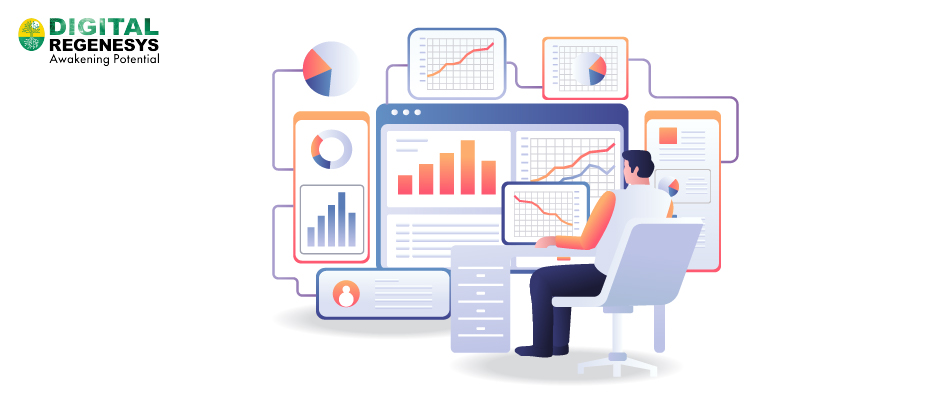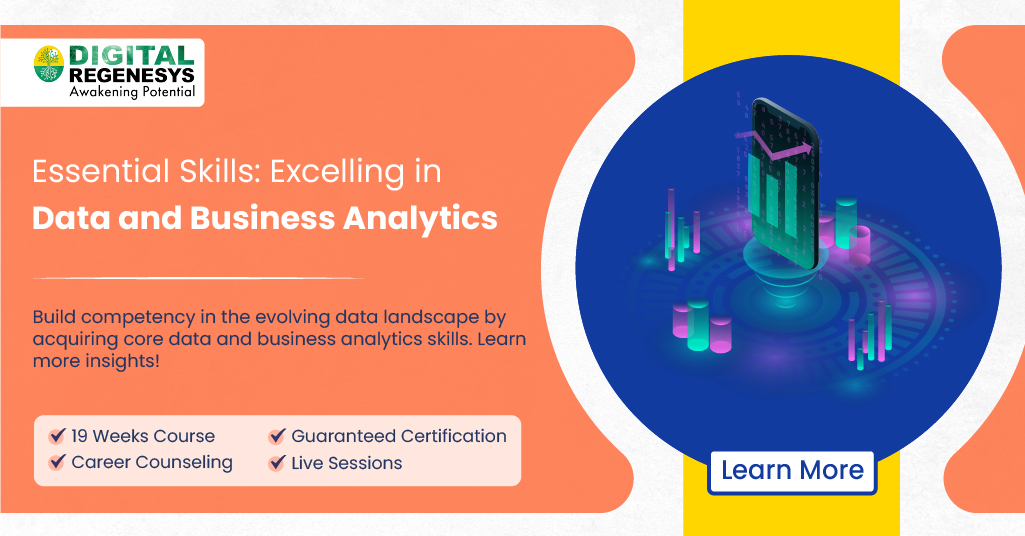What Are the Essential Skills for Data & Business Analytics Professionals?

Data and business analytics are growing fields in today’s data-driven world, as most companies use business data to make informed decisions. As a result, the demand for business analytics professionals is on the rise across the world. So, if you are someone wanting to pursue a career in this field, you are on the right track. However, to enjoy the rewards of a career in data analytics, you must have the core skills. With the help of data analytics courses, you can acquire these skills through significant training and effort.
To become a business analytic professional, you must possess a set of skills, both technical and soft skills. These required skills will not only help you find the proper job role but also guide you to grow as a successful business analyst. While many individuals opt into master’s programmes, almost all learners now prefer online courses for their brief timelines and reasonable fees. But regardless of the route you choose, you must acquire the skills to become a data and business analytic professional. So, let’s look deeply into what core skills these professionals must have.
Role and Responsibilities of Data and Business Analytics Professionals
Data and business analysts serve as the anchor between raw data and valuable insights. In other words, they leverage data to drive strategic decision-making and business growth. Besides, they often collaborate with different departments, from marketing to finance, to comprehend business goals and translate them into data-driven solutions. Hence, their key responsibilities are separated into tasks related to the diverse stages of a project life cycle as follows:
-
Data Extraction:
Data and business analytics professionals often collect structured and unstructured data from multiple sources and use several techniques to store it in the company’s databases.
-
Data Preparation:
Since collected data often comes with errors, extreme values, and other anomalies, data analytics professionals must clean the raw data to turn it into analysis-ready data. Hence, they preprocess and summarise data to find and solve errors.
-
Data Exploration:
At this stage, business analytics professionals use data analysis techniques to analyse the data to find trends and patterns to help them answer specific business questions. Therefore, these professionals use tools like Tableau and Power BI to explore the data.
-
Data Visualisation and Reporting:
After finding the trends and patterns in the data, data analysts must communicate the findings to the stakeholders using graphs, charts and dashboards to facilitate understanding and decision-making
Essential Data and Business Analysts Skills: Technical Skills
A data analyst’s expertise depends on their technical skills. Having these skills helps professionals to make the best use of different types of data analysis, guiding businesses to make the right decision to gain more profits. Besides, these skills enable efficient data manipulation, analysis, and modelling, allowing professionals to extract meaningful insights from data to drive informed decision-making and deliver impactful business outcomes.
So, let’s take a deep look at the core technical data analysts skills:
-
Programming Language Proficiency:
Knowing how to use programming languages like Python and R is crucial for working with data. These programming languages provide powerful features for processing, visualising, and analysing data. By becoming skilled in programming, professionals can effectively manage large datasets, create predictive models, and automate repetitive tasks.
-
Statistical Analytical Knowledge:
A firm grasp of statistical concepts is vital for data analysis methods. Therefore, professionals should be well-versed in probability theory, hypothesis testing, regression analysis, and other statistical methods. As a result, having this statistical knowledge allows them to perform thorough analyses, validate results, and draw trustworthy conclusions from data.
-
Data Visualisation Skills:
Data visualisation involves sharing insights with stakeholders and other professionals. Thus, the professionals should be skilled at making visuals like charts, graphs, and dashboards that effectively present complex information. Tools like Tableau and Power BI allow them to visualise data in an understandable form, promoting better decision-making and understanding.
-
Machine Learning:
Professionals should have a basic grasp of supervised and unsupervised learning and prevalent machine learning algorithms like linear regression, decision trees, and clustering. These machine learning skills allow professionals to create predictive models, find hidden data patterns, and derive meaningful insights to support decision-making.
Core Data and Business Analysts Skills: Soft Skills
Data analysts must have practical soft skills to share their complex findings, work well with stakeholders, and tailor insights for different audiences. Moreover, having soft skills allows analysts to connect technical analysis with business needs, fostering greater understanding and driving organisational success. As a result, these skills often set great data analysts apart from good ones.
So, in this section, let’s explore the key soft skills data and business analytics must possess:
-
Communication Skills:
Data and business analytics experts must explain their findings, insights, and suggestions clearly, concisely, and persuasively to business stakeholders. With strong communication skills, professionals can engage with diverse audiences, including executives, managers, and non-technical stakeholders, and guide them towards data-driven decisions.
-
Critical Thinking:
Business analytics professionals need strong critical thinking abilities to understand and expand the implications of data. That means this skill allows them to analyse information objectively, evaluate assumptions, and draw logical conclusions. Moreover, it helps them make informed decisions and effectively solve complex problems.
-
Attention To Detail:
Meticulous attention to detail is essential for data and business analytics professionals. This ensures data analysis accuracy and identifying patterns, anomalies, and errors. Besides, it enables them to derive reliable insights that drive informed decision-making and business success.
-
Adaptability Skills:
The field of data and business analytics is fast-paced and constantly evolving. Hence, professionals in this field must be able to learn new technologies, methodologies, and approaches quickly. They must also adapt their strategies to changing business requirements and market dynamics to stay ahead of the curve.
Conclusion
Data and business analytical professionals must possess essential skills to thrive in the field. They must acquire a skill set involving analytical, technical, domain-specific, and soft skills to harness data for strategic decision-making. Besides, gaining these core skills helps professionals meet the rising industry demand for data analysis to drive business growth. However, these professionals must engage in continuous learning and skill development to stay competitive and drive innovation in today’s data-driven world.
That is why most professionals today prefer online data and business analytics courses. These courses not only help them to acquire core skills but also help them land the best job positions. With Digital Regenesys, you will get the best Data and Business Analytics course to help you leverage data without coding knowledge. Want to know more? You can visit our website now!
FAQs on What Are the Essential Skills for Data & Business Analytics Professionals?
Last Updated: 4 October 2024

